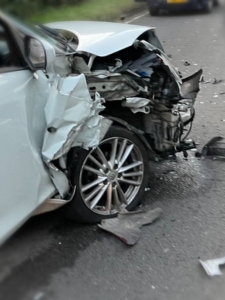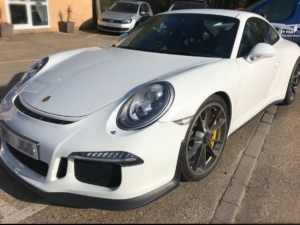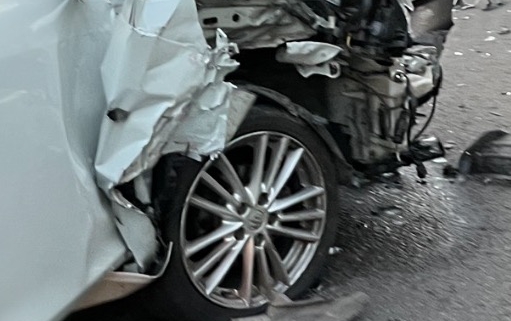Car Scams
Car Scams
…Don’t be their next victim
Buying a car can be one of the second largest investments we make but with fraud surging in the first half of 2023 by 74% compared to the same period in 2022, we need to review how we buy, sell, and maintain our cherished vehicles.
Why have the numbers surged so significantly?
Figures published by Lloyds Bank demonstrate a sharp increase in car and van fraud citing that Vehicles (and their accessories, such as car parts) are now the most common type of online shopping scam reported by victims in the UK.
Statistics from Lloyd’s Bank show each victim loses on average £998 to vehicle related scams.
It’s a lucrative business for fraudsters. Criminals look for opportunities that give them the fastest, easiest way to extract money from unsuspecting people leaving no trace, or ability to get your money back.
Cars are high value items with a huge target audience. Just look down your road: How many cars do you see? 1, 2… or 3+ per house.
A tough economic climate and an undoubtable squeeze on our household budget leaves consumers searching for the impossible deal. Sadly, this environment unlocks a playing field of opportunity for criminals to find their next naïve victim.
What do they do?
They are masters of deception and utilise new technology to their benefit and prey on your insecurities. Below are some of the most common scams whether buying, selling or maintaining your current car.
BUYING A CAR
Fraudsters have this uncanny propensity to convince you that they are the answer to achieving your dreams. With more than two thirds achieving this by advertising on Meta-owned platforms such as Facebook (including Marketplace) or Instagram. And a further 15% using eBay, it’s even more relevant now to ensure they don’t draw you into their scams.
Below are some of the common tricks…

‘One careful lady owner’?
Fake car ads on social media
Fake ads for cars are placed on social media at low prices, some for as little as 50% of its market value. The photo can be of a genuine vehicle appropriated from another site. False address and personal details are added to give the impression of an authentic seller.
Once an interest is shown in their product, they need to convince you to part with your cash. They will pose
In reality, they have your funds, and the car will not arrive.
Fake Car Sales Websites
These can be very convincing. Fake car sales websites often have similar sounding names or logos to genuine dealerships.
They are populated with details and photos of real cars that are for sale elsewhere. They will be offered at a fraction of the market value with ‘massive savings’ or ‘big discounts’ that will be hard to resist.
The customer is asked to pay for them in advance of seeing them to secure the deal and the dealer promises to deliver them once payment has been made. They direct you to a fake website who will handle the transfer of funds and shipping costs for you. In theory, when the car is received, they transfer the funds.
The payment is made, the car is not delivered, and the seller becomes uncontactable.
What Car? Found one fake dealership in Scotland, advertising 79 vehicles for sale to people in the south of England. This increased their chances of being paid online rather than travel to see the vehicle.
Clocked cars
The process of reducing a cars mileage to increase its value has been around for years. But spotting a clocked car is more difficult in the digital world.
Check mileage against the Government MOT History Check service or enlist a vehicle checking service who will provide sufficient details of a cars history and should give you an annual record of mileage.
According to Lloyds Bank, the 5 models reported most often as part of vehicle scams in 2023 are:
- Ford Fiesta
- BMW 1 Series
- VW Transporter (van)
- Mercedes Sprinter (van)
- Audi A3
SELLING YOUR CAR
Criminals will take every opportunity to help you release your cash to them. They are bold and fearless and will have the audacity to not only cold call you, but also come direct to your door!
Fake car buyers
You put your car onto the internet for sale and you are then contacted by a car buyer. Typically, they will have the ‘ideal buyer’ for you who is offering the asking price or sometimes an unrealistic higher price. They will ask you to contact a shipping company on their behalf and pay you by banker’s draft (which can be forged).
You ship the car; the bank rejects the bankers draft and you’re left with no car or payment and the fraudsters leave with no trace.
Vehicle matching scam
Similar to fake car buyers, the car is advertised in a shop window, magazine/paper or online. The seller is contacted and promised that they have a list of buyers lined up who are looking to buy that exact car. All you must do is pay the ‘matching fee’ up front, and they’ll introduce the ‘definite buyer’ to you to complete the sale.
Any payment is lost, and there is no buyer. The Office of Fair Trading have said that consumers lose nearly £3million a year on this kind of fraud.
Payment by cash
If you have achieved a successful sale and the buyer offers cash, you may be inclined to take it? Most serious buyers parting with a substantial amount of money, will opt for the safer transaction of an immediate bank transfer – it protects them and you!
Shield yourself against a potential money launderer and insist on bank transfer.
Dirty oil trick
Often when selling a car, buyers will try to bring down the price by pointing out any defects. In this scam, the aim is to make you believe the engine is faulty. The criminal will arrive with a friend or relative to view the car. One will distract the owner, the other will pour oil into the coolant reservoir, causing smoke to pour out of the engine during the test drive leaving the buyers demanding a huge discount due to the fault.
You give a discount, and they are left with a car that they can fix and sell on, pocketing your money.
Be aware of suspicious behaviour from any potential buyers and be confident to refuse the sale if you are doubtful. Report it to the police and call your garage to rectify the oil contamination.
Theft
It’s not just your money they’re after, but they also target your car removing them from your drive with ease. They use advertising platforms as catalogues to find cars to order. They may enter into conversation with you and even come to view the car, before removing it from your drive.
Currently keyless entry cars are the favoured and easy targets. High value and easy to remove using signal relay equipment. The equipment picks up the fob’s signal from outside a home and is used to unlock and start vehicles without physically having the key.
Be aware of unusual activity such as vans with a car towing dolly or tow trucks. All they need to do is roll the front two wheels onto the dolly and they’re off! Just because they act with confidence, doesn’t mean they should officially be there. Trust your gut feel, ask questions and report it!
Another valuable item which is also very accessible is the catalytic converter which holds valuable metals. These are removed in moments with hydraulic pincers. Much easier on higher vehicles such as 4×4’s and vans which give good access, but also older cars which were made with additional valuable materials before cars became more efficient and demanded less.
Be careful when you share your address and what is shared in your conversation. It is easy to inadvertently say that you watch your son play football every Sunday morning at the local club… you’ve just told them where the car is and how long you will be away!
So, what can we do?

Aspirational car… deal too good to resist… Check authentication
Prevention is better than cure, so protect yourself and try to stay safe from all forms of vehicle scams, by being vigilant:
Always do your own research on who you are buying the car from.
- Don’t give personal details or card details to people you don’t know.
- Never hand over paperwork until you have the money in your account. Use CHAPS/BACS/Paypal/direct money transfer all happen immediately.
- Check documents. Ask to see the sellers V5C logbook. This is your verification that the seller is the legitimate owner.
- Stop, think and be sceptical if there are promises putting you under pressure to make a decision.
- Don’t be distracted. If you suspect foul play, stop the sale. If possible have two people available when the car is viewed and be aware of the buyers ability to tamper with the bonnet or exhaust.
- Only use official websites. Check the web address you are redirected to. Do your research.
- If you think you’ve been the victim of a crash for cash scam, act as you would do in a genuine accident – gather other party’s details. Report the incident to the police and your insurer stating that you think it was a staged accident.
- Only buy car insurance from bonafide companies.
- Report fraudsters – Don’t give them the ability to scam others!
Sadly, no-one is impervious to a cleverly put together scam. It is emotionally tough to feel that someone has played on your good nature. The reality is, these people don’t care that you’ll be left out of pocket, as long as they’re lining their own.
Don’t be the next victim of crime. The safest way to buy a new or used car is from a well-known, approved dealer that is known to you. If a deal looks ‘too good to be true’, it usually is.
If you need any help with buying or selling your car, or would like the reassurance of a safety check on your new purchase, give us a call. We’re happy to help ?



